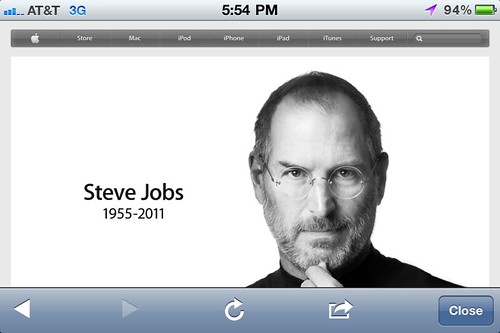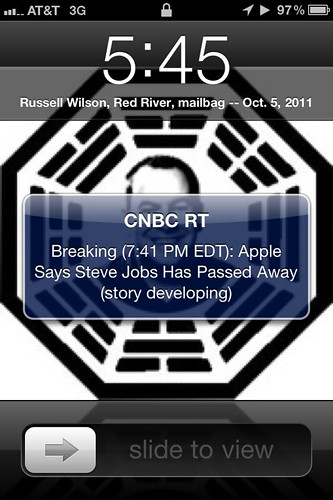Apple co-founder, chairman and (until very recently) CEO Steve Jobs, whose inventions repeatedly changed the world as we know it, died today of complications from pancreatic cancer. He was 56.
His death prompted massive news coverage (totally overshadowing Sarah Palin’s decision not to run for president) and an overwhelming outpouring of public grief more typical of a head of state’s death than a corporate CEO’s. But of course, Jobs was no ordinary CEO. He was — well, I’ll let President Obama say it:
Steve was among the greatest of American innovators – brave enough to think differently, bold enough to believe he could change the world, and talented enough to do it.
By building one of the planet’s most successful companies from his garage, he exemplified the spirit of American ingenuity. By making computers personal and putting the internet in our pockets, he made the information revolution not only accessible, but intuitive and fun. And by turning his talents to storytelling, he has brought joy to millions of children and grownups alike. Steve was fond of saying that he lived every day like it was his last. Because he did, he transformed our lives, redefined entire industries, and achieved one of the rarest feats in human history: he changed the way each of us sees the world.
The world has lost a visionary. And there may be no greater tribute to Steve’s success than the fact that much of the world learned of his passing on a device he invented. Michelle and I send our thoughts and prayers to Steve’s wife Laurene, his family, and all those who loved him.
On that last point, I am one of the many who learned of Jobs’s death on an Apple device. The above screenshot was taken with my iPhone a few minutes later, but here’s a shot of the actual breaking-news moment — a push notification from my CNBC app, superimposed over the Mandel Initiative podcast, which I was listening to on my drive home:
One more reaction for you, from none other than Bill Gates:
I’m truly saddened to learn of Steve Jobs’ death. Melinda and I extend our sincere condolences to his family and friends, and to everyone Steve has touched through his work.
Steve and I first met nearly 30 years ago, and have been colleagues, competitors and friends over the course of more than half our lives. The world rarely sees someone who has had the profound impact Steve has had, the effects of which will be felt for many generations to come.
For those of us lucky enough to get to work with him, it’s been an insanely great honor. I will miss Steve immensely.
R.I.P., Steve Jobs.
P.S. Above, a more personal reflection by David K.



I typically have served as a main anti-Apple foil for Brendan and David on this blog — sometimes I have legitimate concerns about their products and business strategies, other times I’m just playing devil’s advocate — but it should go without saying that I have tremendous respect for Steve Jobs as a businessman, an innovator, and an American icon. Jobs exemplified what could be achieved if an organization and its leadership could master the confluence of human intuition and experience with the rapidly advancing world of information technology. For nearly a decade now, every other consumer electronics and IT company in the world has been playing catch-up to Apple and Jobs, and while I have felt for some time that Apple’s market lead is slipping and will soon come back to the pack, that notion had more to do with the near impossibility of maintaining such high levels of growth, profitability, and market share over such an extended period of time. Still, Jobs was the X factor that allowed for any reason to second-guess whether Apple would at some point fall back to Earth; had his health and longevity not been in doubt, any bet against Apple would be a fool’s wager. Nevertheless, Jobs is perhaps the perfect embodiment of the capitalist notion that wealth is created, and his example strikes a near-mortal blow to the more mercantilist or socialist view that wealth is stolen or otherwise unfairly, unjustly, or unequitably hoarded by the rich. Jobs’ shadow and memory will reverberate for years to come, to the benefit of all of us. Rest in Peace.
Leave it to Andrew to turn a memorial post into a chance to take a cheap political shot, one that wasn’t even shared by the man being remembered. Classy.
“Cheap political shot”? Nothing in that comment had anything to do with politics unless you automatically equate economic theory with political theory, in which case you’re essentially calling yourself a socialist, and in which case makes your love for Jobs and Apple all the more mystifying and hypocritical. To my knowledge, Jobs was fairly apolitical. My comment was as well. Your response was not.
In any case, I am quite pleased to see that my sentiments have been quite common around the blogosphere, by Apple fanatics, Apple ambivalents, and Apple opponents alike. It is likely that Jobs will be considered the Last Great Capitalist that we are permitted to worship (despite the fact that, contrary to his status as hero-legend, he was ruthless and manipulative behind the scenes). To me, Kevin Williamson sums up the special lesson of Steve Jobs perfectly:
Apple — as a result of Jobs — added (and still adds) real social value to this world, and this is measured in the ridiculousness of its profit margins rather than its corporate goodwill (Jobs killed corporate philanthropy when he returned to Apple and never restored it even as Apple briefly peaked as the most valuable corporation in the world). Jobs may not have lived long enough to fulfill everything he wanted to accomplish, but I have come to the conclusion that he probably died content knowing that he changed the world with his vision and drive, and that he maximized what life he was given.